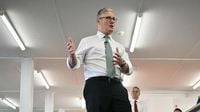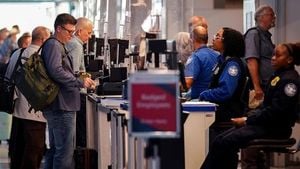Labour’s ruling National Executive Committee (NEC) met on Monday, September 8, 2025, to draw up the rules and timetable for the party’s deputy leadership contest, a development triggered by the abrupt resignation of Angela Rayner. Rayner, who had served as both deputy leader and deputy prime minister, stepped down after admitting to underpaying £40,000 in stamp duty on a new home earlier in the year, a breach that an ethics investigation found violated the ministerial code, according to BBC News.
The fallout from Rayner’s resignation has set off a political firestorm within Labour, with the NEC’s decisions expected to shape not only the leadership contest but also the party’s direction in the months ahead. The contest’s rules, as reported by BBC News, require candidates to secure nominations from 80 Labour MPs—20% of the parliamentary party—as well as support from at least three affiliate groups, including two unions, or 5% of local parties. The NEC considered proposals for a rapid timeline, including hustings for MPs on Wednesday, September 10, and a tight nomination deadline of 17:00 BST on Thursday, September 11.
This accelerated schedule has sparked accusations of a “stitch-up” from Labour’s left wing. According to The Independent, Richard Burgon MP described the process as the “mother of all stitch-ups,” arguing that the short window for nominations is “a desperate move to keep Labour members’ voices out of this race and to dodge serious discussion on what’s gone wrong over the last year.” Former shadow chancellor John McDonnell echoed these concerns, saying it was “pretty clear leadership wants to bounce their own candidate [through].”
The contest to replace Rayner is shaping up as a major battle over Labour’s future. Dame Emily Thornberry was the first high-profile figure to signal her intention to run, announcing on Sunday, September 7, that she was considering a bid. “I’m thinking about it … it’s really a question of what can I bring to it,” Thornberry told reporters, as cited by The Independent. Thornberry, who previously served as shadow international trade secretary, was a surprise omission from Sir Keir Starmer’s new government lineup.
Other potential contenders have begun to emerge. Former transport secretary Louise Haigh called for an “economic reset” and reforms to Labour’s fiscal rules in an article for the New Statesman on Monday, September 8, but stopped short of declaring her candidacy. Haigh, known as a leading left-wing voice before she resigned last year after pleading guilty to a decade-old fraud offense, is seen by some as a figure who could broaden the contest’s ideological range.
Labour’s Mayor of Greater Manchester, Andy Burnham, used the moment to call for a “discussion about the internal management” of the party. He warned that the Cabinet lacked “balance” after Rayner’s exit and advocated for a deputy leader from the north of England to counter what he described as the “London-centricity” of Starmer’s leadership. Burnham suggested that Haigh or former Commons leader Lucy Powell could help restore regional diversity at the top of the party.
Other names floated as possible candidates include Alison McGovern and NHS doctor Rosena Allin-Khan, while Labour MP Dawn Butler hinted at a run on social media, writing, “This is an important time for MPs to get together to discuss who our next Deputy Leader will be. Unfortunately, there's a tube strike, and it's a very very short deadline. We must never be afraid of a fair process.” Butler’s message, accompanied by a Commons photo captioned “just a teaser,” underscored the sense of urgency and frustration among some MPs about the contest’s speed.
The debate over the contest’s fairness has coincided with broader ideological jockeying within Labour. The launch of a new centre-left network called “Mainstream”—described as the home of Labour’s “radical realists”—has been backed by key figures including Andy Burnham, Clive Efford, Paula Barker, Dawn Butler, and Clive Lewis, as reported by The Independent. The group’s emergence signals a push for a pragmatic approach to policy and party management, as Labour faces both internal and external challenges.
Baroness Harriet Harman, a Labour peer and former acting party leader, weighed in on the debate over the next deputy leader’s profile. She told BBC Radio’s Today programme, “I don’t think we can have a male Prime Minister, a man as deputy prime minister and a male deputy leader of the party. We need somebody who is not a counterpoint to the leader, but is complementary to the leader, will broaden the reach of the leader and galvanise the party.” Harman’s comments reflect a growing call for greater gender and regional diversity at the party’s top levels.
The leadership contest comes on the heels of a major government reshuffle orchestrated by Sir Keir Starmer. According to BBC News and The Independent, David Lammy has replaced Rayner as deputy prime minister, Steve Reed has taken over the housing department, Yvette Cooper is now foreign secretary, and Shabana Mahmood has become home secretary. Rachel Reeves remains as chancellor, making this the first time the UK has had three women in the most senior cabinet roles alongside the prime minister. The reshuffle, announced around the weekend of September 8, 2025, reflects Starmer’s effort to draw a line under the Rayner scandal and present a unified, forward-looking team.
The contest for deputy leader is not just a matter of party mechanics; it has real policy implications. Paul Nowak, general secretary of the Trades Union Congress, issued a warning to government over its flagship workers’ rights legislation, which Rayner had championed. Nowak insisted the plans “cannot be watered down in the wake of her resignation,” and criticized Reform UK leader Nigel Farage for “selling out” workers. “It’s time to come clean about whose side you are really on. Because here’s the truth – you’re not representing working people, you are selling them out,” Nowak said, as quoted by The Independent.
Meanwhile, Shabana Mahmood, the new home secretary, has already begun high-level engagements, meeting with counterparts from the Five Eyes alliance to discuss international efforts to tackle smuggling gangs in London. This comes as the number of small boat crossings reached more than 30,000 in 2025, presenting a significant challenge for the new Cabinet.
As Labour prepares for its annual conference, the race to replace Rayner threatens to overshadow Starmer’s attempts to project stability and momentum. Rayner, who was seen as a bridge between government and backbenchers and was popular among grassroots members, leaves a gap that will be difficult to fill—both politically and personally. The coming days will reveal whether Labour can navigate this period of turbulence and emerge with a deputy leader who can unite its various factions and help steer the party through the next phase of its journey.






